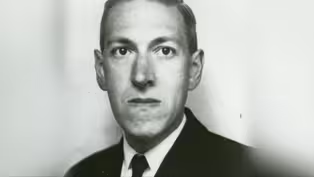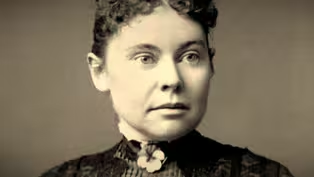
My Take: Witches
Clip: Season 4 Episode 44 | 6m 4sVideo has Closed Captions
Historian and author Beth Caruso shares a new perspective on witch trials.
The Salem Witch Trials, where 19 people were executed, is a dark chapter of history that has now become part of popular lore. But few know that New England’s witch hysteria actually began 45 years earlier in Connecticut. As part of the continuing series My Take, historian and author Beth Caruso shares her unique perspective on witches.
Problems playing video? | Closed Captioning Feedback
Problems playing video? | Closed Captioning Feedback
Rhode Island PBS Weekly is a local public television program presented by Ocean State Media

My Take: Witches
Clip: Season 4 Episode 44 | 6m 4sVideo has Closed Captions
The Salem Witch Trials, where 19 people were executed, is a dark chapter of history that has now become part of popular lore. But few know that New England’s witch hysteria actually began 45 years earlier in Connecticut. As part of the continuing series My Take, historian and author Beth Caruso shares her unique perspective on witches.
Problems playing video? | Closed Captioning Feedback
How to Watch Rhode Island PBS Weekly
Rhode Island PBS Weekly is available to stream on pbs.org and the free PBS App, available on iPhone, Apple TV, Android TV, Android smartphones, Amazon Fire TV, Amazon Fire Tablet, Roku, Samsung Smart TV, and Vizio.
Providing Support for PBS.org
Learn Moreabout PBS online sponsorship- Connecticut was the first colony that had witch executions.
However, many people in Connecticut do not even know about them.
My name is Beth Caruso, and this is my take on witches.
In New England, there were mostly women who were targeted as witches.
And back in those days, these women, these alleged witches, many were healers, many were people who spoke up for themselves, who did not take flack, who did not fit into the Puritan box of what it was to be a good woman.
It also had to do with women's roles with fertility.
Those women who did not have as many children were viewed with suspicion, that they would be jealous of the other women.
There were men who were sometimes accused of witchcraft as well, but they were often associated with women.
So it was largely due to misogyny of the time, or it was due to some type of community panic, an epidemic, animals dying, and the community didn't understand it and was looking for someone to blame.
There's several differences between Massachusetts and Connecticut.
The Salem witch trials are well documented and well studied.
Arthur Miller, in his play "The Crucible," really brought attention to the Salem trials.
There has been no such play or any type of movie like that in Connecticut.
The history of those trials hasn't been as well known among the populace itself.
It hasn't been taught in schools as much.
In Connecticut, there were a total of 35 people indicted for witchcraft, 13 convictions, and 11 people actually hanged, 9 women and 2 men.
Alice Young is significant because she was the very first person to die for witchcraft crimes in New England, and actually in all the colonies.
It happened during the time of an influenza epidemic.
And during that epidemic, it just so happened that there were four children living right next door to Alice Young who died that year, while Alice Young's only daughter lived.
And once that execution happened, the witch accusations flew up and down the Connecticut River Valley.
In fact, Connecticut, the first seven people accused of witchcraft were also indicted and later hanged.
So seven for seven, it was pretty brutal.
We need to learn from our history.
Unfortunately, it's repeating right now.
There are conspiracy theories that abound, Pizzagate, QAnon that talk about certain targeted groups drinking the blood of children, satanic connections.
All these things are lies, all these things are untrue.
And they follow the same energy, the same pattern of those witch hunts back in the 1600s.
The Connecticut Witch Trial Exoneration Project is a group of people who want to fight the unjust reputations of the people who were alleged witches.
Most of these people are descendants of the people who died for witchcraft crimes, and their ancestors have had to deal with stigma for many decades, many centuries.
They want the historical record corrected through exoneration in Connecticut.
In the course of writing my book that I found out my husband is actually related to Lydia Gilbert, Windsor's second witch trial victim.
And so for my sons and for my husband, it's important for me that her story gets out and that people understand she wasn't a witch.
My name is Beth Caruso, and that was my take on witches.
- That's our broadcast this evening.
Video has Closed Captions
Clip: S4 Ep44 | 11m 44s | Famous, local horror writer H.P. Lovecraft had a frightening flaw that may shock readers. (11m 44s)
Video has Closed Captions
Clip: S4 Ep44 | 9m 56s | David Wright reports on one of the most notorious murders in New England’s history. (9m 56s)
Providing Support for PBS.org
Learn Moreabout PBS online sponsorship
- News and Public Affairs

Top journalists deliver compelling original analysis of the hour's headlines.

- News and Public Affairs

FRONTLINE is investigative journalism that questions, explains and changes our world.












Support for PBS provided by:
Rhode Island PBS Weekly is a local public television program presented by Ocean State Media

